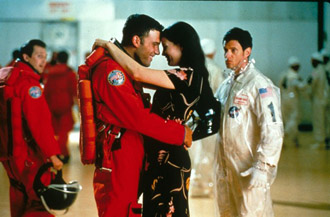Sole Criterion: The Rock and Armageddon
By Brett Ballard-Beach
September 27, 2012
They are populated with action sequences that are needless and obligatory and yet are the very foundations of said films. It brought to my mind what might be the Bay Caveat to Roger Ebert’s old Idiot Plot cliché. That of course refers to a film where the plot would be resolved quite quickly if the characters weren’t required to behave like idiots and misunderstand each other or avoid saying the sentence that would clear things up. The Bay Caveat is where a film would be much much shorter if its characters didn’t take such time and effort to blow shit up real good in place of detective work or talking things out. And the running times of Bay’s films bear this out. Tossing out the shortest (Bad Boys at 119 minutes) and the longest (Pearl Harbor at 183 minutes), all the other fall in between two and a quarter and two and a half hours.
Also padding out the time are moments of would-be character development, plot artifice, and endless bantering among the ensemble casts that doesn’t really deliver anything revealing or quote-worthy. These elements ring false because they are what keep interrupting the action instead of the other way around. The payoff for the San Francisco extended mayhem sequence, which begins with Connery’s character fleeing from his hotel suite, is revealed as his attempt to grab a few minutes to talk with the daughter he barely knows (what with being locked up for 30 years and all). While the moment is about as tender and honest as one can find in Bay’s output to date, it is also evidence of his discomfort with these emotions. Gunplay, car chases, and loud explosions are the currency with which his characters communicate. I note that this “private” father/daughter moment is played out in the middle of the public sphere and climaxes with the squeal of two-dozen cop cars coming to a screeching halt in a near circle around the pair.
Similarly in Armageddon, the farewell exchange between Willis and Tyler as he prepares to sacrifice himself to detonate the asteroid and she remains helpless back on Earth is the most genuine moment of sentiment Bay has committed to celluloid. Willis and Tyler are both allowed to be restrained and teary, stoic and fragile, and yet, this moment plays out in the middle of mission control (and if I am not mistaken, at least audio-wise, for the whole planet?) with his forlorn visage peering out from every bank of screens and monitors that NASA could find to spend money on. (On a side note, a 90 second scene in the unrated director’s cut features Willis visiting and saying goodbye to his dying dad, all taut gruffness, and memorably acted by Lawrence Tierney in one of his final roles. It speaks volumes that this tender heart to heart could find no room in the theatrical version.)
From a screenplay standpoint, The Rock is more nuanced in its characterizations than any of Bay’s other films, with a “villain” who is operating from a high(er) moral ground and a fair amount of melancholic rage. A career military man initiates a hostage situation to extort money from the government as compensation for the families of the soldiers who died without recognition under his command. Ed Harris, with the threat of violence in his voice and the reality of sadness and disillusionment in those deep blue eyes, sells the contradiction of a patriot turning terrorist to make a point. As a result, the film has to ramp up a pair from his band of mercenaries to become the real villains (although they are still allowed to die the ridiculously violent deaths that are often accorded to the chief henchmen of the main villain).
Cage and Connery make a great odd couple (or makeshift father/son pairing) and Bay gets significant mileage out of contrasting the latter’s “effortless because it’s second nature” badass persona with the nervous tics of the former, a chemical weapons authority (er, “superfreak”) trying on the persona of a gun toting commando. Hearing Connery in his purring brogue toss off the putdown that “Losers always whine about their best” is more satisfying than any of the insults tossed around in either Bad Boys film. A sequel reuniting the two of them - needless as it may have been - could have been a lot of fun. In retrospect, the closing scene of The Rock now looks like a very prescient set-up for National Treasure.
Continued:
1
2
3
4




